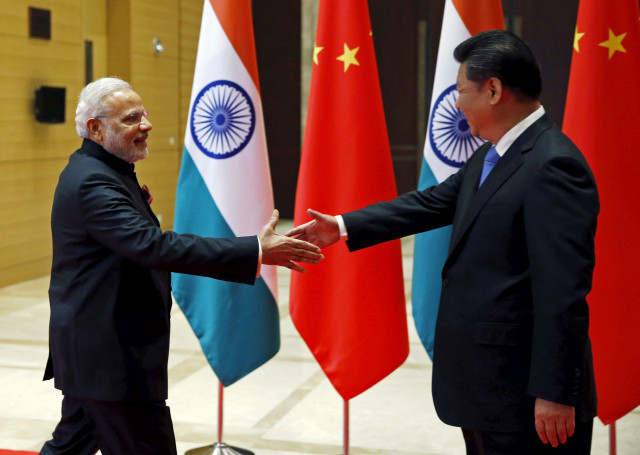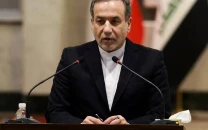Modi should join CPEC, stop selling 'pipe dream' of quadrilateral alternative, says former official
Sudheendra Kulkarni lambastes Indian government for heeding 'short sighted advisors' on Chinese projects in region

Indian Prime Minister Narendra Modi and Chinese President Xi Jinping shake hands before they hold a meeting in Xian, Shaanxi province, China. PHOTO: REUTERS
Sudheendra Kulkarni, who served at the Indian Prime Minister Office during former leader Atal Bihari Vajpayee’s tenure, made the remarks in an opinion piece for The Hindu.
He stated that despite being neighbours, India and Pakistan are among the least integrated nations in the world.
The independent media in India and Pakistan often ignore calls for mutually beneficial economic cooperation between the two South Asian countries, instead preferring to stir up negative emotions which further the ideological divide and fan traditional rivalries to a dangerous extent, the former Indian government official said while writing for The Hindu.
"Because of their unending mutual hostility, South Asia too has become the least integrated region in the world. The South Asian Association for Regional Cooperation (SAARC) is in a coma," he opined in a column for the Hindu publication.
India requests new Apache helicopters from US to protect border with Pakistan, China
"Sadly, the most populous region in the world is also home to the largest number of poor people in the world," Kulkarni lamented.
So near, yet so far
According to the former official, a few striking examples show how the two countries, which were part of a socio-economic and administrative entity before 1947, have now completely drifted apart.
Kulkarni notes that there are no direct flights between New Delhi and Islamabad. The frequency of Delhi-Lahore and Mumbai-Karachi flights have become minimal, and the Mumbai-Karachi ferry service (the two port cities, once part of a single province, are closer to each other than either Mumbai and Delhi or Karachi and Islamabad) has been dismantled since the 1965 war.
In this age of information revolution, Kulkarni says, the number of phone calls between Indian and Pakistani citizens (including calls between close relatives of divided families) is negligible.
"At less than $3 billion annually, trade with Pakistan accounts for a meagre 0.4% of India’s growing global commerce," he reveals.
India issues démarches to Pakistan, China on construction of dams
Those who are happy with this status quo have set certain responses, the former official apprised the readers.
"On the Indian side, it is said that terror and trade cannot go together. The Narendra Modi government has raised the bar higher - terror and talks cannot go together. On the Pakistani side, resolution of the Kashmir issue has become a precondition for any substantial bilateral cooperation," he underlined.
But is the status quo benefiting either country?
In Kulkarni's opinion, the answer is obvious, except to those Indians who think India now has a seat on the global high table and hence need not care for Pakistan, and Pakistani patriots who think they need not care for India since they now have international protectors.
China, of course, has become a new factor influencing India’s negative attitude towards Pakistan, both among policy-makers and the common people, he observes.
"Our Army chief General Bipin Rawat’s egregious remark last year about India being ready for a simultaneous two-and-a-half front war with Pakistan and China (the “half front” being our own alienated people in Kashmir) has helped solidify an impression that our two large neighbours can never be friendly towards India," the former official wrote in the op-ed piece.
Nuclear conflict: Pakistan, India increasingly reliant on mediators
Kulkarni is of the opinon that if India’s foreign and defence policies proceed on this belief, South Asia is surely heading towards a future of intensified hostilities and conflicts.
"Arms manufacturers and distant destabilisers will profit by this at the cost of common Indians and Pakistanis, who need employment, education, health care and food-and-environmental security."
He also stressed that the basic needs of the common man can be met only through regional cooperation, not regional rivalry.
China, part of the solution
In other words, can China become a part of the solution, rather than being perceived as a part of the India-Pakistan problem?
"A three-way India-China-Pakistan cooperation is not only necessary but indeed possible, and Chinese President Xi Jinping’s Belt and Road Initiative (BRI) provides a practical framework for such partnership," the former official wrote.
But he criticised the Indian government, saying that "unfortunately, Modi has allowed himself to be misled by his advisers on the BRI".
According to Kulkarni, the Indian government’s opposition to the BRI is based, among other things, on the myopic argument that the China-Pakistan Economic Corridor (CPEC), a flagship project under the BRI, violates India’s sovereignty since it passes through the disputed valley of Kashmir.
Not only does this argument hold no water but it also undermines India’s long-term development and security interests, he has noted.
"There is little possibility of India ever getting Azad Kashmir, or Pakistan ever getting the Indian Occupied Kashmir, through war or by any other means. Therefore, connectivity, cooperation and economic integration are the only realistic bases for any future India-Pakistan settlement of the Kashmir dispute."
Indian army chief accuses Pakistan and China for migrant influx in Assam
Another important consideration in this whole scenario is that both China and Pakistan have stated that they are open to India joining CPEC.
China has expressed its readiness to rename CPEC suitably to both address India’s concerns and to reflect the project’s expanded regional scope, according to the former official.
"Already, Iran, Afghanistan and several Central Asian republics have agreed to join this ambitious regional connectivity project."
"Will it help or hurt India if it joins this renamed initiative as an equal partner? Will it not connect Lahore and Amritsar (also Delhi and the rest of India), the two sides of Kashmir (which all Kashmir-based political parties want), Sindh and southern Punjab with Gujarat and Rajasthan, and Karachi with Mumbai?" Kulkarni asked.
Interdependence vital
The former government official states that a no less seminal benefit for India is that by joining the renamed CPEC, it would gain land access, through Pakistan, to Afghanistan, Iran, Central Asia and western China.
"And if our leaders show vision, ambition and resolve, the CPEC-plus-India can be linked to the Bangladesh-China-India-Myanmar Corridor, thus creating a grand garland of connectivity and integration for the whole of South Asia," he added.
‘Pakistan needs institutional reforms to grow like China, India’
Kulkarni noted that the same short-sighted advisers who have misled Modi on the BRI and CPEC are selling India the pipe dream of an alternative connectivity project by the “Quadrilateral” of the US, Japan, Australia and India.
"This is unlikely to take off. Even if it does, its developmental benefits to India will be limited since it will seek to keep China and Pakistan out," he outlined.
"We are also told that India does not need the CPEC since it has already partnered with Iran in building the Chabahar port. India’s gains due to Chabahar are modest, and nowhere comparable to those that would accrue by India having a direct land access to Afghanistan through Pakistan, courtesy a renamed CPEC," Kulkarni said.
"The latter is also indispensable for the success of two other mega projects that are critical for India’s energy security and accelerated economic growth - the Turkmenistan-Afghanistan-Pakistan-India (TAPI) and Iran-Pakistan-India gas pipelines," he added.
In his conclduing reamrks, the former official said that CPEC is another huge potential gain for South Asia. The proposed connectivity initiative, which would create strong new bonds of regional cooperation and interdependence, could also help resolve three long-standing geopolitical problems in the region, in which countless people have been killed - terrorism, Kashmir and Afghanistan.
This article originally appeared on The Hindu


















COMMENTS
Comments are moderated and generally will be posted if they are on-topic and not abusive.
For more information, please see our Comments FAQ